Interventions for Promoting Well-being and Preventing Mental Disorders
VerifiedAdded on 2020/06/06
|6
|2492
|34
Report
AI Summary
The report delves into various approaches to promote mental health in communities, emphasizing the role of the Mental Health Foundation in leading initiatives that foster social inclusion and personal empowerment. By focusing on education and training, communities can equip individuals with skills necessary for emotional resilience and problem-solving. Interventions aim at early identification of problems, promoting positive mental health from childhood through adulthood. The report concludes by underscoring the importance of integrating information and strategies to support individuals with mental health issues, striving towards a stigma-free society where everyone can flourish.
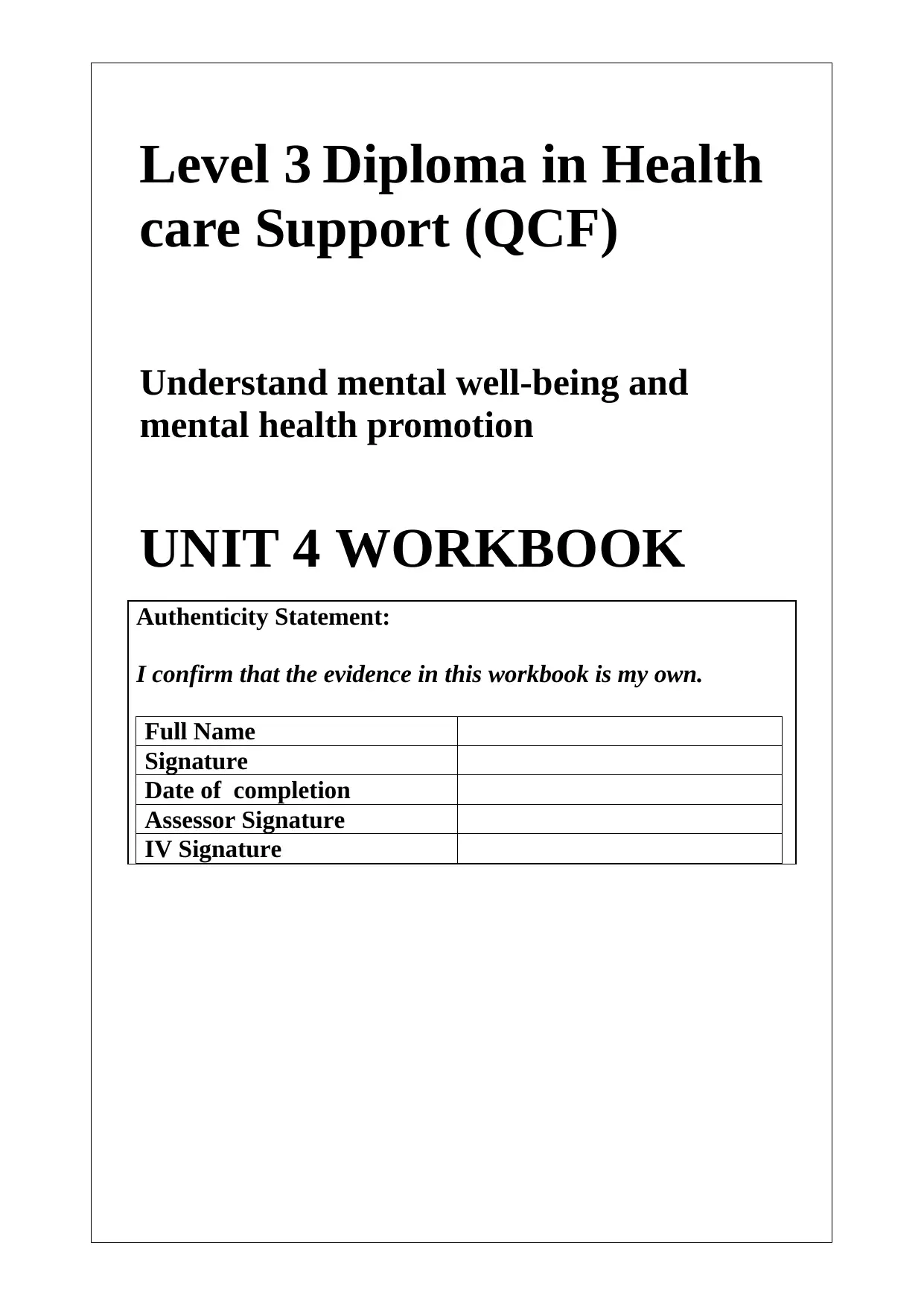
Level 3 Diploma in Health
care Support (QCF)
Understand mental well-being and
mental health promotion
UNIT 4 WORKBOOK
Authenticity Statement:
I confirm that the evidence in this workbook is my own.
Full Name
Signature
Date of completion
Assessor Signature
IV Signature
care Support (QCF)
Understand mental well-being and
mental health promotion
UNIT 4 WORKBOOK
Authenticity Statement:
I confirm that the evidence in this workbook is my own.
Full Name
Signature
Date of completion
Assessor Signature
IV Signature
Paraphrase This Document
Need a fresh take? Get an instant paraphrase of this document with our AI Paraphraser
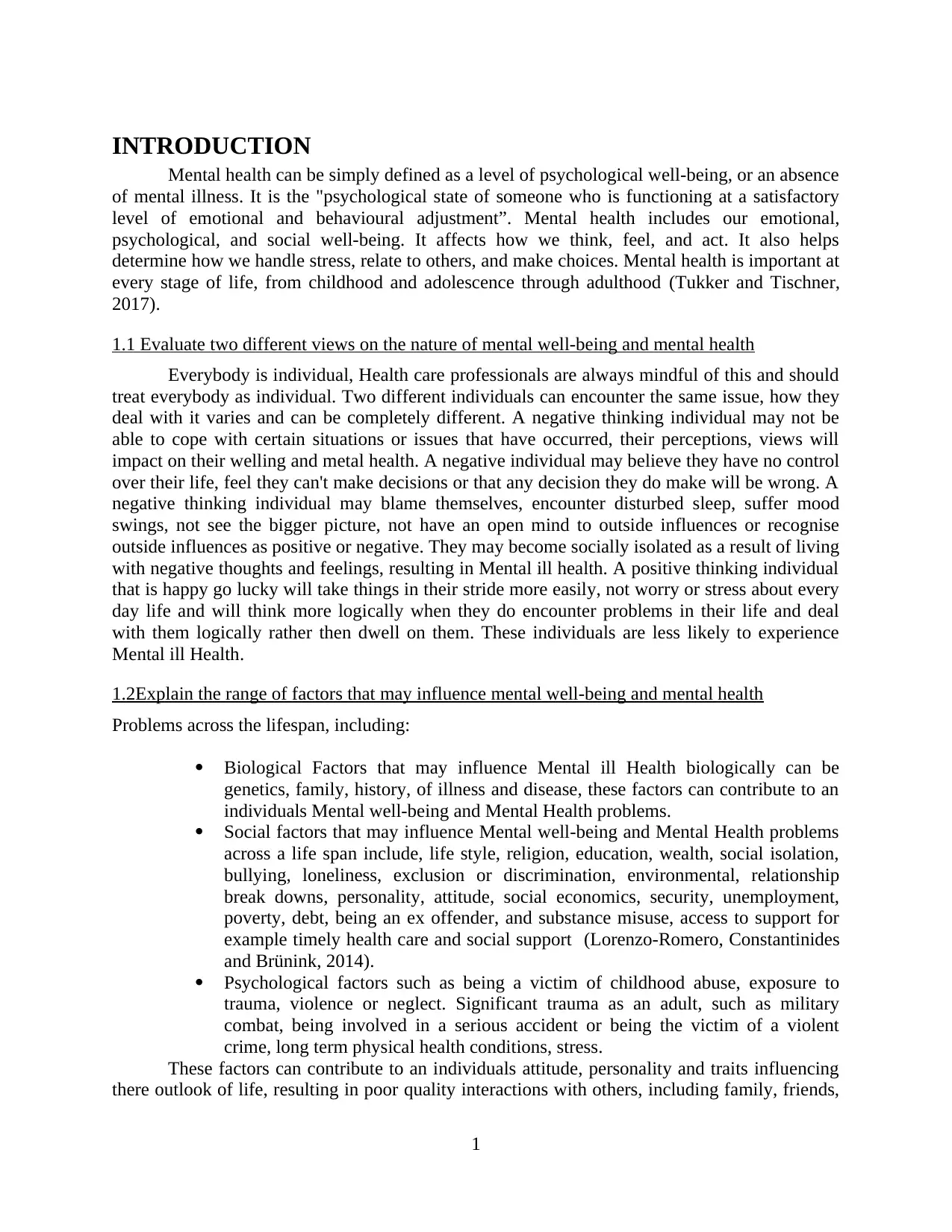
INTRODUCTION
Mental health can be simply defined as a level of psychological well-being, or an absence
of mental illness. It is the "psychological state of someone who is functioning at a satisfactory
level of emotional and behavioural adjustment”. Mental health includes our emotional,
psychological, and social well-being. It affects how we think, feel, and act. It also helps
determine how we handle stress, relate to others, and make choices. Mental health is important at
every stage of life, from childhood and adolescence through adulthood (Tukker and Tischner,
2017).
1.1 Evaluate two different views on the nature of mental well-being and mental health
Everybody is individual, Health care professionals are always mindful of this and should
treat everybody as individual. Two different individuals can encounter the same issue, how they
deal with it varies and can be completely different. A negative thinking individual may not be
able to cope with certain situations or issues that have occurred, their perceptions, views will
impact on their welling and metal health. A negative individual may believe they have no control
over their life, feel they can't make decisions or that any decision they do make will be wrong. A
negative thinking individual may blame themselves, encounter disturbed sleep, suffer mood
swings, not see the bigger picture, not have an open mind to outside influences or recognise
outside influences as positive or negative. They may become socially isolated as a result of living
with negative thoughts and feelings, resulting in Mental ill health. A positive thinking individual
that is happy go lucky will take things in their stride more easily, not worry or stress about every
day life and will think more logically when they do encounter problems in their life and deal
with them logically rather then dwell on them. These individuals are less likely to experience
Mental ill Health.
1.2Explain the range of factors that may influence mental well-being and mental health
Problems across the lifespan, including:
Biological Factors that may influence Mental ill Health biologically can be
genetics, family, history, of illness and disease, these factors can contribute to an
individuals Mental well-being and Mental Health problems.
Social factors that may influence Mental well-being and Mental Health problems
across a life span include, life style, religion, education, wealth, social isolation,
bullying, loneliness, exclusion or discrimination, environmental, relationship
break downs, personality, attitude, social economics, security, unemployment,
poverty, debt, being an ex offender, and substance misuse, access to support for
example timely health care and social support (Lorenzo-Romero, Constantinides
and Brünink, 2014).
Psychological factors such as being a victim of childhood abuse, exposure to
trauma, violence or neglect. Significant trauma as an adult, such as military
combat, being involved in a serious accident or being the victim of a violent
crime, long term physical health conditions, stress.
These factors can contribute to an individuals attitude, personality and traits influencing
there outlook of life, resulting in poor quality interactions with others, including family, friends,
1
Mental health can be simply defined as a level of psychological well-being, or an absence
of mental illness. It is the "psychological state of someone who is functioning at a satisfactory
level of emotional and behavioural adjustment”. Mental health includes our emotional,
psychological, and social well-being. It affects how we think, feel, and act. It also helps
determine how we handle stress, relate to others, and make choices. Mental health is important at
every stage of life, from childhood and adolescence through adulthood (Tukker and Tischner,
2017).
1.1 Evaluate two different views on the nature of mental well-being and mental health
Everybody is individual, Health care professionals are always mindful of this and should
treat everybody as individual. Two different individuals can encounter the same issue, how they
deal with it varies and can be completely different. A negative thinking individual may not be
able to cope with certain situations or issues that have occurred, their perceptions, views will
impact on their welling and metal health. A negative individual may believe they have no control
over their life, feel they can't make decisions or that any decision they do make will be wrong. A
negative thinking individual may blame themselves, encounter disturbed sleep, suffer mood
swings, not see the bigger picture, not have an open mind to outside influences or recognise
outside influences as positive or negative. They may become socially isolated as a result of living
with negative thoughts and feelings, resulting in Mental ill health. A positive thinking individual
that is happy go lucky will take things in their stride more easily, not worry or stress about every
day life and will think more logically when they do encounter problems in their life and deal
with them logically rather then dwell on them. These individuals are less likely to experience
Mental ill Health.
1.2Explain the range of factors that may influence mental well-being and mental health
Problems across the lifespan, including:
Biological Factors that may influence Mental ill Health biologically can be
genetics, family, history, of illness and disease, these factors can contribute to an
individuals Mental well-being and Mental Health problems.
Social factors that may influence Mental well-being and Mental Health problems
across a life span include, life style, religion, education, wealth, social isolation,
bullying, loneliness, exclusion or discrimination, environmental, relationship
break downs, personality, attitude, social economics, security, unemployment,
poverty, debt, being an ex offender, and substance misuse, access to support for
example timely health care and social support (Lorenzo-Romero, Constantinides
and Brünink, 2014).
Psychological factors such as being a victim of childhood abuse, exposure to
trauma, violence or neglect. Significant trauma as an adult, such as military
combat, being involved in a serious accident or being the victim of a violent
crime, long term physical health conditions, stress.
These factors can contribute to an individuals attitude, personality and traits influencing
there outlook of life, resulting in poor quality interactions with others, including family, friends,
1
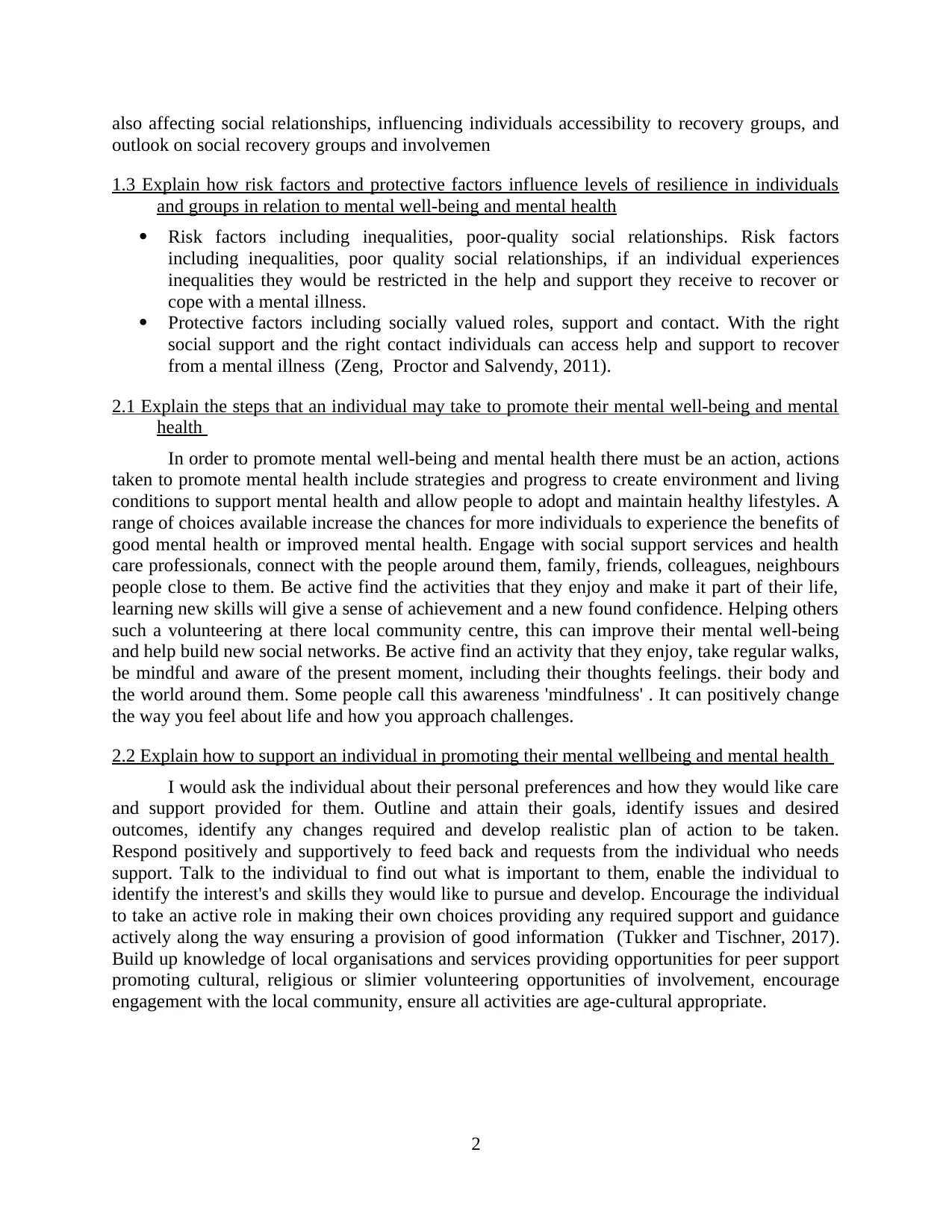
also affecting social relationships, influencing individuals accessibility to recovery groups, and
outlook on social recovery groups and involvemen
1.3 Explain how risk factors and protective factors influence levels of resilience in individuals
and groups in relation to mental well-being and mental health
Risk factors including inequalities, poor-quality social relationships. Risk factors
including inequalities, poor quality social relationships, if an individual experiences
inequalities they would be restricted in the help and support they receive to recover or
cope with a mental illness.
Protective factors including socially valued roles, support and contact. With the right
social support and the right contact individuals can access help and support to recover
from a mental illness (Zeng, Proctor and Salvendy, 2011).
2.1 Explain the steps that an individual may take to promote their mental well-being and mental
health
In order to promote mental well-being and mental health there must be an action, actions
taken to promote mental health include strategies and progress to create environment and living
conditions to support mental health and allow people to adopt and maintain healthy lifestyles. A
range of choices available increase the chances for more individuals to experience the benefits of
good mental health or improved mental health. Engage with social support services and health
care professionals, connect with the people around them, family, friends, colleagues, neighbours
people close to them. Be active find the activities that they enjoy and make it part of their life,
learning new skills will give a sense of achievement and a new found confidence. Helping others
such a volunteering at there local community centre, this can improve their mental well-being
and help build new social networks. Be active find an activity that they enjoy, take regular walks,
be mindful and aware of the present moment, including their thoughts feelings. their body and
the world around them. Some people call this awareness 'mindfulness' . It can positively change
the way you feel about life and how you approach challenges.
2.2 Explain how to support an individual in promoting their mental wellbeing and mental health
I would ask the individual about their personal preferences and how they would like care
and support provided for them. Outline and attain their goals, identify issues and desired
outcomes, identify any changes required and develop realistic plan of action to be taken.
Respond positively and supportively to feed back and requests from the individual who needs
support. Talk to the individual to find out what is important to them, enable the individual to
identify the interest's and skills they would like to pursue and develop. Encourage the individual
to take an active role in making their own choices providing any required support and guidance
actively along the way ensuring a provision of good information (Tukker and Tischner, 2017).
Build up knowledge of local organisations and services providing opportunities for peer support
promoting cultural, religious or slimier volunteering opportunities of involvement, encourage
engagement with the local community, ensure all activities are age-cultural appropriate.
2
outlook on social recovery groups and involvemen
1.3 Explain how risk factors and protective factors influence levels of resilience in individuals
and groups in relation to mental well-being and mental health
Risk factors including inequalities, poor-quality social relationships. Risk factors
including inequalities, poor quality social relationships, if an individual experiences
inequalities they would be restricted in the help and support they receive to recover or
cope with a mental illness.
Protective factors including socially valued roles, support and contact. With the right
social support and the right contact individuals can access help and support to recover
from a mental illness (Zeng, Proctor and Salvendy, 2011).
2.1 Explain the steps that an individual may take to promote their mental well-being and mental
health
In order to promote mental well-being and mental health there must be an action, actions
taken to promote mental health include strategies and progress to create environment and living
conditions to support mental health and allow people to adopt and maintain healthy lifestyles. A
range of choices available increase the chances for more individuals to experience the benefits of
good mental health or improved mental health. Engage with social support services and health
care professionals, connect with the people around them, family, friends, colleagues, neighbours
people close to them. Be active find the activities that they enjoy and make it part of their life,
learning new skills will give a sense of achievement and a new found confidence. Helping others
such a volunteering at there local community centre, this can improve their mental well-being
and help build new social networks. Be active find an activity that they enjoy, take regular walks,
be mindful and aware of the present moment, including their thoughts feelings. their body and
the world around them. Some people call this awareness 'mindfulness' . It can positively change
the way you feel about life and how you approach challenges.
2.2 Explain how to support an individual in promoting their mental wellbeing and mental health
I would ask the individual about their personal preferences and how they would like care
and support provided for them. Outline and attain their goals, identify issues and desired
outcomes, identify any changes required and develop realistic plan of action to be taken.
Respond positively and supportively to feed back and requests from the individual who needs
support. Talk to the individual to find out what is important to them, enable the individual to
identify the interest's and skills they would like to pursue and develop. Encourage the individual
to take an active role in making their own choices providing any required support and guidance
actively along the way ensuring a provision of good information (Tukker and Tischner, 2017).
Build up knowledge of local organisations and services providing opportunities for peer support
promoting cultural, religious or slimier volunteering opportunities of involvement, encourage
engagement with the local community, ensure all activities are age-cultural appropriate.
2
⊘ This is a preview!⊘
Do you want full access?
Subscribe today to unlock all pages.

Trusted by 1+ million students worldwide
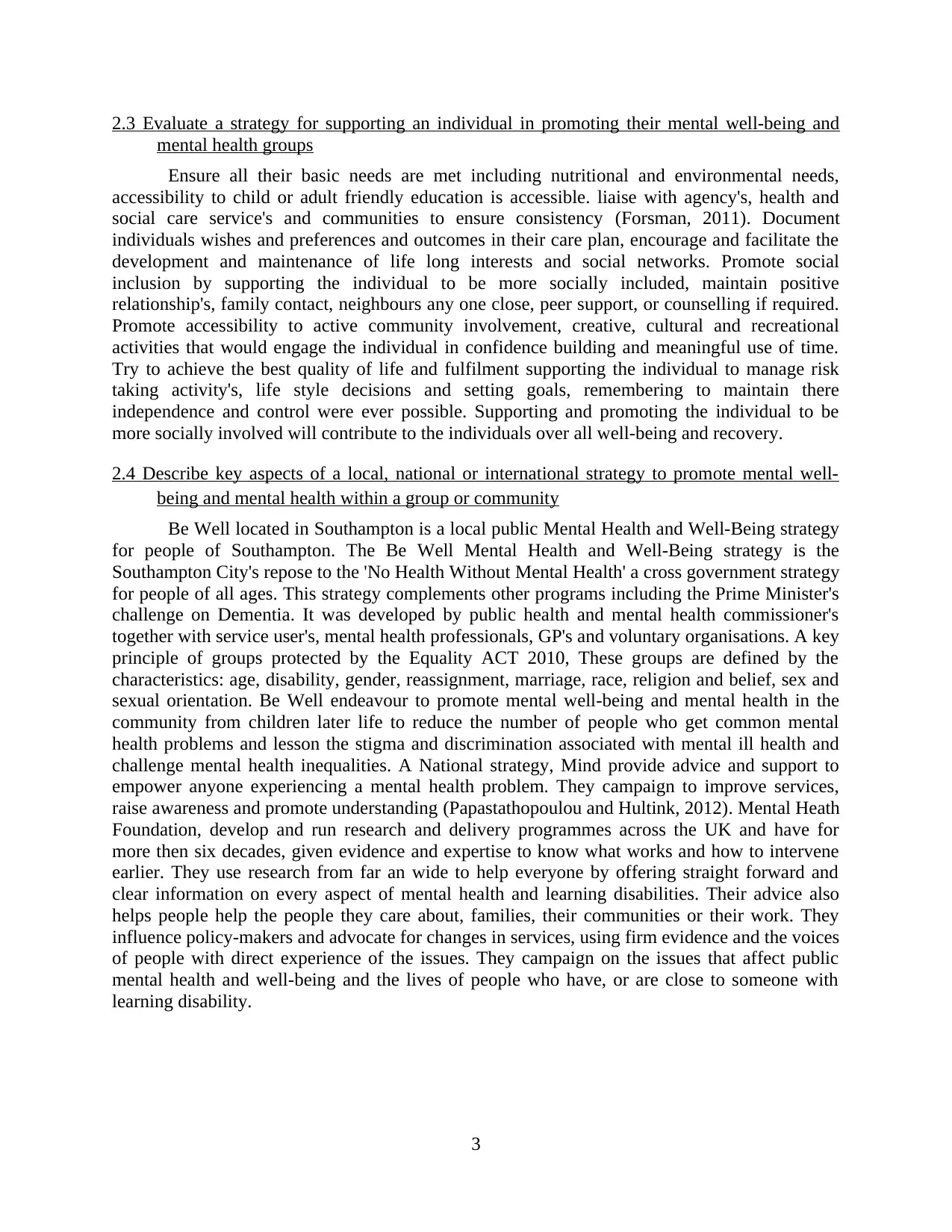
2.3 Evaluate a strategy for supporting an individual in promoting their mental well-being and
mental health groups
Ensure all their basic needs are met including nutritional and environmental needs,
accessibility to child or adult friendly education is accessible. liaise with agency's, health and
social care service's and communities to ensure consistency (Forsman, 2011). Document
individuals wishes and preferences and outcomes in their care plan, encourage and facilitate the
development and maintenance of life long interests and social networks. Promote social
inclusion by supporting the individual to be more socially included, maintain positive
relationship's, family contact, neighbours any one close, peer support, or counselling if required.
Promote accessibility to active community involvement, creative, cultural and recreational
activities that would engage the individual in confidence building and meaningful use of time.
Try to achieve the best quality of life and fulfilment supporting the individual to manage risk
taking activity's, life style decisions and setting goals, remembering to maintain there
independence and control were ever possible. Supporting and promoting the individual to be
more socially involved will contribute to the individuals over all well-being and recovery.
2.4 Describe key aspects of a local, national or international strategy to promote mental well-
being and mental health within a group or community
Be Well located in Southampton is a local public Mental Health and Well-Being strategy
for people of Southampton. The Be Well Mental Health and Well-Being strategy is the
Southampton City's repose to the 'No Health Without Mental Health' a cross government strategy
for people of all ages. This strategy complements other programs including the Prime Minister's
challenge on Dementia. It was developed by public health and mental health commissioner's
together with service user's, mental health professionals, GP's and voluntary organisations. A key
principle of groups protected by the Equality ACT 2010, These groups are defined by the
characteristics: age, disability, gender, reassignment, marriage, race, religion and belief, sex and
sexual orientation. Be Well endeavour to promote mental well-being and mental health in the
community from children later life to reduce the number of people who get common mental
health problems and lesson the stigma and discrimination associated with mental ill health and
challenge mental health inequalities. A National strategy, Mind provide advice and support to
empower anyone experiencing a mental health problem. They campaign to improve services,
raise awareness and promote understanding (Papastathopoulou and Hultink, 2012). Mental Heath
Foundation, develop and run research and delivery programmes across the UK and have for
more then six decades, given evidence and expertise to know what works and how to intervene
earlier. They use research from far an wide to help everyone by offering straight forward and
clear information on every aspect of mental health and learning disabilities. Their advice also
helps people help the people they care about, families, their communities or their work. They
influence policy-makers and advocate for changes in services, using firm evidence and the voices
of people with direct experience of the issues. They campaign on the issues that affect public
mental health and well-being and the lives of people who have, or are close to someone with
learning disability.
3
mental health groups
Ensure all their basic needs are met including nutritional and environmental needs,
accessibility to child or adult friendly education is accessible. liaise with agency's, health and
social care service's and communities to ensure consistency (Forsman, 2011). Document
individuals wishes and preferences and outcomes in their care plan, encourage and facilitate the
development and maintenance of life long interests and social networks. Promote social
inclusion by supporting the individual to be more socially included, maintain positive
relationship's, family contact, neighbours any one close, peer support, or counselling if required.
Promote accessibility to active community involvement, creative, cultural and recreational
activities that would engage the individual in confidence building and meaningful use of time.
Try to achieve the best quality of life and fulfilment supporting the individual to manage risk
taking activity's, life style decisions and setting goals, remembering to maintain there
independence and control were ever possible. Supporting and promoting the individual to be
more socially involved will contribute to the individuals over all well-being and recovery.
2.4 Describe key aspects of a local, national or international strategy to promote mental well-
being and mental health within a group or community
Be Well located in Southampton is a local public Mental Health and Well-Being strategy
for people of Southampton. The Be Well Mental Health and Well-Being strategy is the
Southampton City's repose to the 'No Health Without Mental Health' a cross government strategy
for people of all ages. This strategy complements other programs including the Prime Minister's
challenge on Dementia. It was developed by public health and mental health commissioner's
together with service user's, mental health professionals, GP's and voluntary organisations. A key
principle of groups protected by the Equality ACT 2010, These groups are defined by the
characteristics: age, disability, gender, reassignment, marriage, race, religion and belief, sex and
sexual orientation. Be Well endeavour to promote mental well-being and mental health in the
community from children later life to reduce the number of people who get common mental
health problems and lesson the stigma and discrimination associated with mental ill health and
challenge mental health inequalities. A National strategy, Mind provide advice and support to
empower anyone experiencing a mental health problem. They campaign to improve services,
raise awareness and promote understanding (Papastathopoulou and Hultink, 2012). Mental Heath
Foundation, develop and run research and delivery programmes across the UK and have for
more then six decades, given evidence and expertise to know what works and how to intervene
earlier. They use research from far an wide to help everyone by offering straight forward and
clear information on every aspect of mental health and learning disabilities. Their advice also
helps people help the people they care about, families, their communities or their work. They
influence policy-makers and advocate for changes in services, using firm evidence and the voices
of people with direct experience of the issues. They campaign on the issues that affect public
mental health and well-being and the lives of people who have, or are close to someone with
learning disability.
3
Paraphrase This Document
Need a fresh take? Get an instant paraphrase of this document with our AI Paraphraser
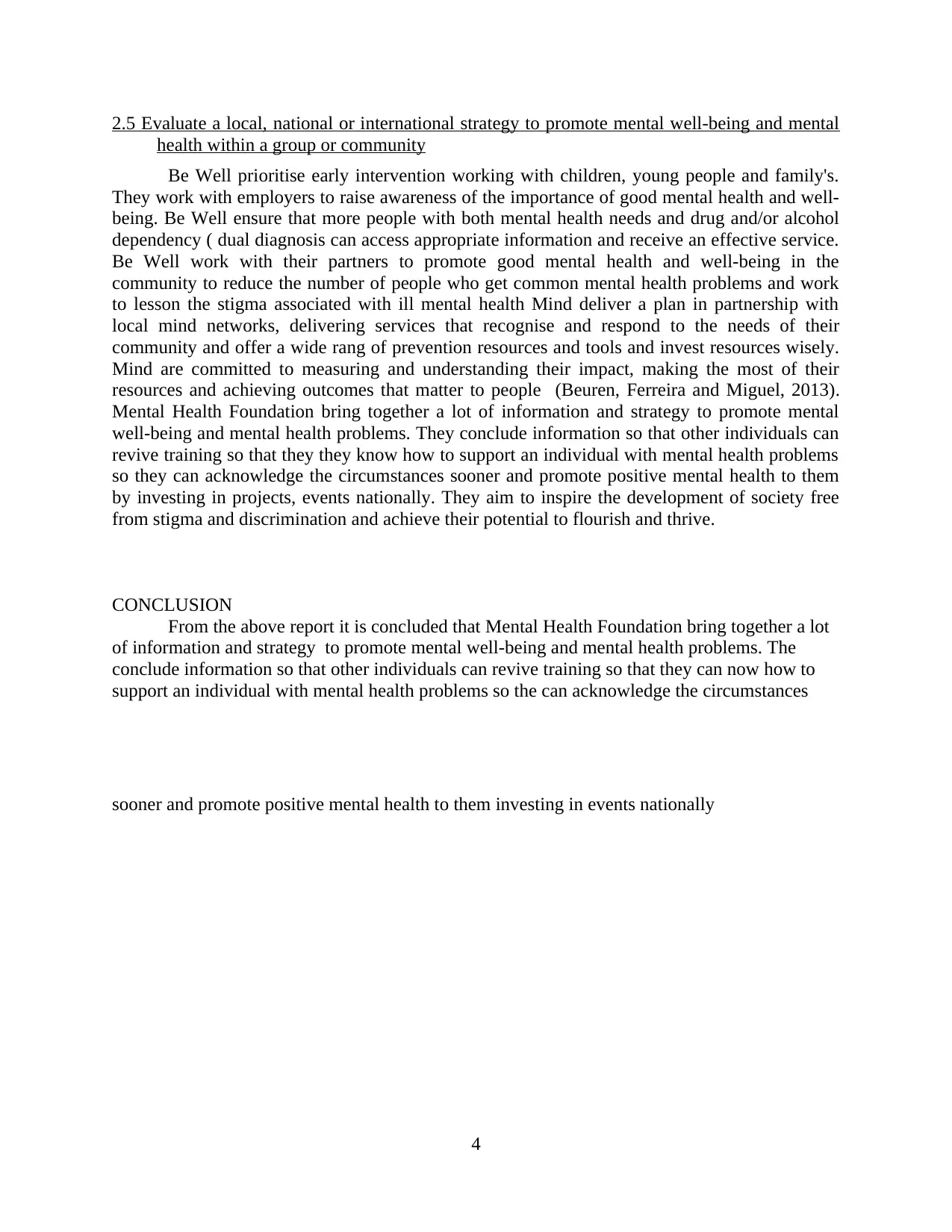
2.5 Evaluate a local, national or international strategy to promote mental well-being and mental
health within a group or community
Be Well prioritise early intervention working with children, young people and family's.
They work with employers to raise awareness of the importance of good mental health and well-
being. Be Well ensure that more people with both mental health needs and drug and/or alcohol
dependency ( dual diagnosis can access appropriate information and receive an effective service.
Be Well work with their partners to promote good mental health and well-being in the
community to reduce the number of people who get common mental health problems and work
to lesson the stigma associated with ill mental health Mind deliver a plan in partnership with
local mind networks, delivering services that recognise and respond to the needs of their
community and offer a wide rang of prevention resources and tools and invest resources wisely.
Mind are committed to measuring and understanding their impact, making the most of their
resources and achieving outcomes that matter to people (Beuren, Ferreira and Miguel, 2013).
Mental Health Foundation bring together a lot of information and strategy to promote mental
well-being and mental health problems. They conclude information so that other individuals can
revive training so that they they know how to support an individual with mental health problems
so they can acknowledge the circumstances sooner and promote positive mental health to them
by investing in projects, events nationally. They aim to inspire the development of society free
from stigma and discrimination and achieve their potential to flourish and thrive.
CONCLUSION
From the above report it is concluded that Mental Health Foundation bring together a lot
of information and strategy to promote mental well-being and mental health problems. The
conclude information so that other individuals can revive training so that they can now how to
support an individual with mental health problems so the can acknowledge the circumstances
sooner and promote positive mental health to them investing in events nationally
4
health within a group or community
Be Well prioritise early intervention working with children, young people and family's.
They work with employers to raise awareness of the importance of good mental health and well-
being. Be Well ensure that more people with both mental health needs and drug and/or alcohol
dependency ( dual diagnosis can access appropriate information and receive an effective service.
Be Well work with their partners to promote good mental health and well-being in the
community to reduce the number of people who get common mental health problems and work
to lesson the stigma associated with ill mental health Mind deliver a plan in partnership with
local mind networks, delivering services that recognise and respond to the needs of their
community and offer a wide rang of prevention resources and tools and invest resources wisely.
Mind are committed to measuring and understanding their impact, making the most of their
resources and achieving outcomes that matter to people (Beuren, Ferreira and Miguel, 2013).
Mental Health Foundation bring together a lot of information and strategy to promote mental
well-being and mental health problems. They conclude information so that other individuals can
revive training so that they they know how to support an individual with mental health problems
so they can acknowledge the circumstances sooner and promote positive mental health to them
by investing in projects, events nationally. They aim to inspire the development of society free
from stigma and discrimination and achieve their potential to flourish and thrive.
CONCLUSION
From the above report it is concluded that Mental Health Foundation bring together a lot
of information and strategy to promote mental well-being and mental health problems. The
conclude information so that other individuals can revive training so that they can now how to
support an individual with mental health problems so the can acknowledge the circumstances
sooner and promote positive mental health to them investing in events nationally
4
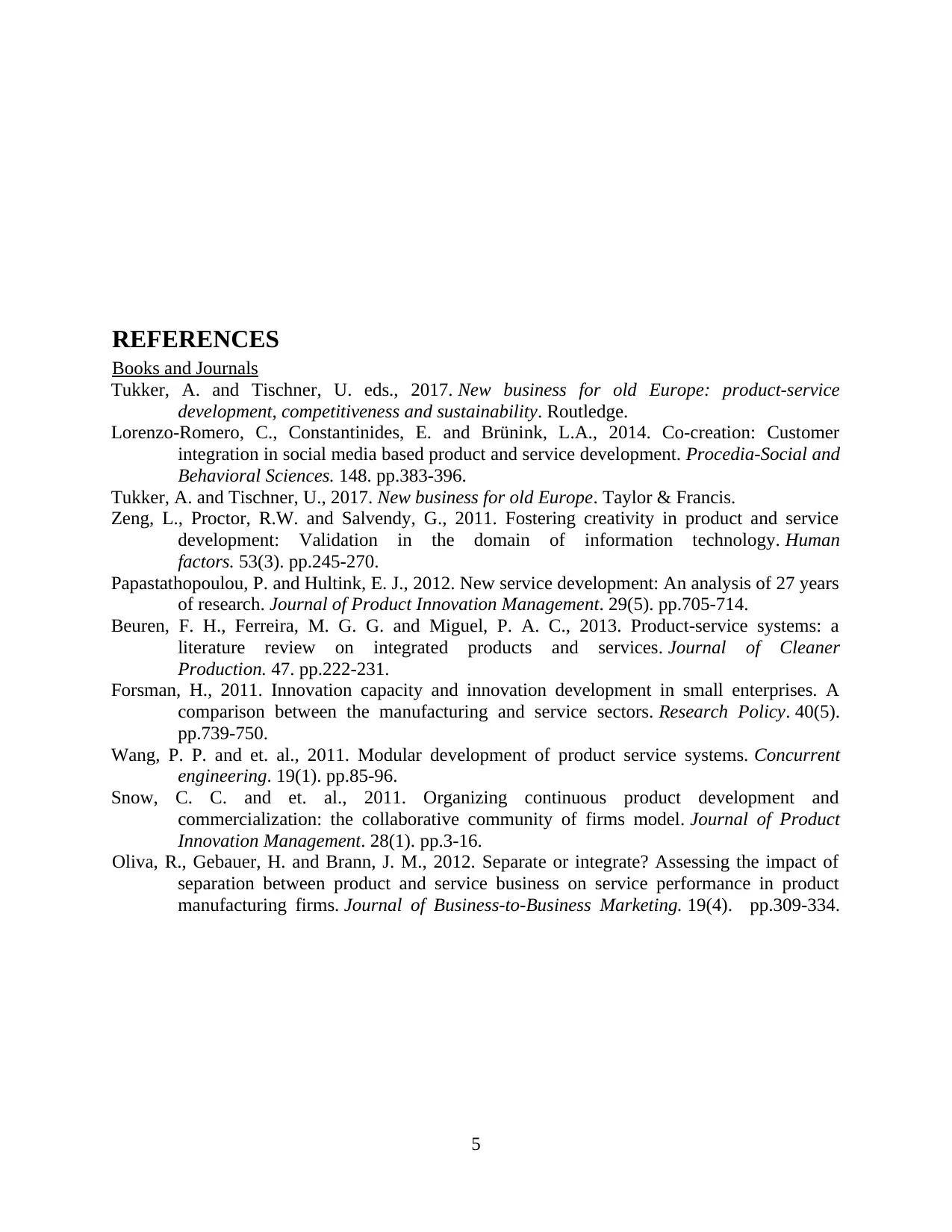
REFERENCES
Books and Journals
Tukker, A. and Tischner, U. eds., 2017. New business for old Europe: product-service
development, competitiveness and sustainability. Routledge.
Lorenzo-Romero, C., Constantinides, E. and Brünink, L.A., 2014. Co-creation: Customer
integration in social media based product and service development. Procedia-Social and
Behavioral Sciences. 148. pp.383-396.
Tukker, A. and Tischner, U., 2017. New business for old Europe. Taylor & Francis.
Zeng, L., Proctor, R.W. and Salvendy, G., 2011. Fostering creativity in product and service
development: Validation in the domain of information technology. Human
factors. 53(3). pp.245-270.
Papastathopoulou, P. and Hultink, E. J., 2012. New service development: An analysis of 27 years
of research. Journal of Product Innovation Management. 29(5). pp.705-714.
Beuren, F. H., Ferreira, M. G. G. and Miguel, P. A. C., 2013. Product-service systems: a
literature review on integrated products and services. Journal of Cleaner
Production. 47. pp.222-231.
Forsman, H., 2011. Innovation capacity and innovation development in small enterprises. A
comparison between the manufacturing and service sectors. Research Policy. 40(5).
pp.739-750.
Wang, P. P. and et. al., 2011. Modular development of product service systems. Concurrent
engineering. 19(1). pp.85-96.
Snow, C. C. and et. al., 2011. Organizing continuous product development and
commercialization: the collaborative community of firms model. Journal of Product
Innovation Management. 28(1). pp.3-16.
Oliva, R., Gebauer, H. and Brann, J. M., 2012. Separate or integrate? Assessing the impact of
separation between product and service business on service performance in product
manufacturing firms. Journal of Business-to-Business Marketing. 19(4). pp.309-334.
5
Books and Journals
Tukker, A. and Tischner, U. eds., 2017. New business for old Europe: product-service
development, competitiveness and sustainability. Routledge.
Lorenzo-Romero, C., Constantinides, E. and Brünink, L.A., 2014. Co-creation: Customer
integration in social media based product and service development. Procedia-Social and
Behavioral Sciences. 148. pp.383-396.
Tukker, A. and Tischner, U., 2017. New business for old Europe. Taylor & Francis.
Zeng, L., Proctor, R.W. and Salvendy, G., 2011. Fostering creativity in product and service
development: Validation in the domain of information technology. Human
factors. 53(3). pp.245-270.
Papastathopoulou, P. and Hultink, E. J., 2012. New service development: An analysis of 27 years
of research. Journal of Product Innovation Management. 29(5). pp.705-714.
Beuren, F. H., Ferreira, M. G. G. and Miguel, P. A. C., 2013. Product-service systems: a
literature review on integrated products and services. Journal of Cleaner
Production. 47. pp.222-231.
Forsman, H., 2011. Innovation capacity and innovation development in small enterprises. A
comparison between the manufacturing and service sectors. Research Policy. 40(5).
pp.739-750.
Wang, P. P. and et. al., 2011. Modular development of product service systems. Concurrent
engineering. 19(1). pp.85-96.
Snow, C. C. and et. al., 2011. Organizing continuous product development and
commercialization: the collaborative community of firms model. Journal of Product
Innovation Management. 28(1). pp.3-16.
Oliva, R., Gebauer, H. and Brann, J. M., 2012. Separate or integrate? Assessing the impact of
separation between product and service business on service performance in product
manufacturing firms. Journal of Business-to-Business Marketing. 19(4). pp.309-334.
5
⊘ This is a preview!⊘
Do you want full access?
Subscribe today to unlock all pages.

Trusted by 1+ million students worldwide
1 out of 6
Related Documents
Your All-in-One AI-Powered Toolkit for Academic Success.
+13062052269
info@desklib.com
Available 24*7 on WhatsApp / Email
![[object Object]](/_next/static/media/star-bottom.7253800d.svg)
Unlock your academic potential
Copyright © 2020–2026 A2Z Services. All Rights Reserved. Developed and managed by ZUCOL.




